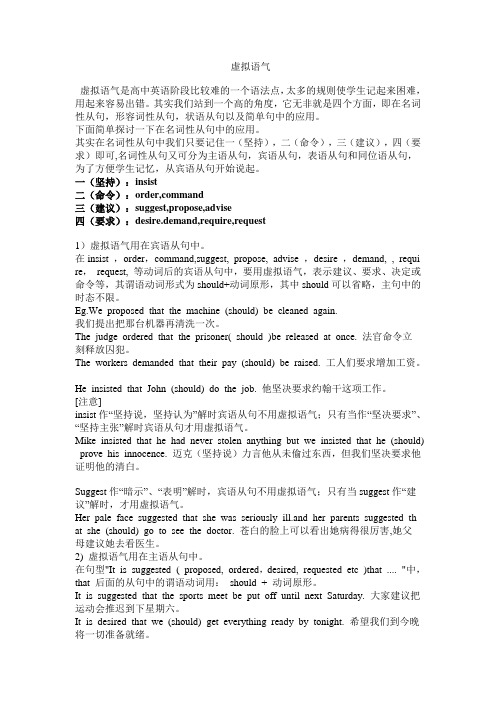虚拟语气用于名词性从句
名词性从句中的虚拟语气

虚拟语气在表语从句中的用法
在系动词be+形容词引导的表语从句中
虚拟语气在表语从句中常用于表达某种假设或条件,如“The problem is that we should start our project earlier.”
在系动词be+名词引导的表语从句中
虚拟语气也可以用于描述某种结果或事实,如“The conclusion is that they would have won the game if they had scored more points.”
虚拟语气在主语从句中的用法
要点一
在It is/was+形容词/名词+that 引导的主语…
虚拟语气在主语从句中常用于表达某种假设或条件,如“It is crucial that we should act quickly.”
要点二
在It is/was+过去分词+that引导 的主语从句中
虚拟语气也可以用于描述某种结果或事实,如“It is said that he would have won the election if he had run a better campaign.”
虚拟语气的用法
表示与现实相反的情况
当描述与现实情况相反的情况时,使用虚拟语气来表达。
表示假设条件
在描述假设条件时,使用虚拟语气来表达。
表示个人意愿
在表达个人意愿时,使用虚拟语气来强调个人主观意愿。
02 名词性从句中的虚拟语气分类
与现在事实相反的虚拟语气
总结词
表示与现在事实相反的情况,假设的情况是假的,而实际情况是相反的。
详细描述
在虚拟语气中,与现在事实相反的情况通常通过使用动词的过去时态来表示, 如“If I were you, I would…”或“He suggested that we should leave early.”。这种虚拟语气常用于表达建议、要求、愿望等。
高考英语考点归纳(四)—虚拟语气

虚拟语气虚拟语气表示说话人的愿望,假设,猜测或建议,而不是表示客观存在的事实。
高考考查虚拟语气主要和情态动词相结合。
1(1be动词的过去式用were”。
如:►. If I were a boy, I would join the army.►(2则用过去分词”►(4)当条件状语从句表示的行为和主句表示的行为所发生的时间不一致时,动词的形式要根据它所表示的时间作相应调整。
如:►. If they had worked hard, they would be very tired.(从句说的是过去,主句指的是现在)►. Were I a boy, I would join the army.►. Had he taken my advice, he would have succeeded.►. Were it not for the expense, I would go to Britain.2、虚拟语气用于名词性从句(①。
表示不能实现的愿望,译为“要是……就好了”等。
表示将来不能实现的愿望,从句中的谓语动词用“would/could + 动词原形”;表示过去不能实现的愿望,从句中的谓语动词用“had + 过去分词”或“could(should) + have + 过去分词”。
如:►. I wish it were spring all the year round.►. I wish I had known the answer.►suggest, advise, propose, demand, require, insist, request,should + 动词原形或是动词原形。
如:►. She suggested we (should) leave here at once.►(2作表示建议、等的表语从句和同位语从句,从句中的谓语动词用“(should)+ 动词原形”。
如:►. His suggestion that we (should)go to Shanghai is wonderful.►(3“should + 动词原形”►. It is necessary (important, natural, strange, etc.) that we should clean the room every day.►. It was a pity (a shame, no wonder, etc.) that you should be so careless.►. It will be desired (suggested, decided, ordered, requested, proposed, etc.) that she should finish her homework this afternoon.注意:这种从句表示的是事实。
虚拟语气在名词性从句中的应用

句型It is important/ necessary/ natural/ strange (etc.) that…,主语从句中可用虚拟 语气,结构为:
(should) + v. 原型
Eg. (1) Experts suggested that the ________________________ planned economy (should) be transferred into market economy (计划经济转变到市场 ______________________________. 经济)(transfer) Eg. (2) It was suggested that the meeting _______________ (should) be put ____ (推迟)till next week. (put) off Eg. (3) His disappointed expression suggested he_________ didn’t ________prove) Eg. (4) I insisted that he_______________________ (should) not take any risk .(不要 冒任何风险)(take) Eg. (5) The defendant insisted in the court that he _______ didn’t ____________.( do things wrong 没有做错)
Eg. (6) What do you think of my proposal that new teaching approaches ________________________ ?(实施) (should) be carried out (carry) Eg. (7) My only advice for you is that you ______________ (should) quit ________ smoking .(戒烟) (quit)
虚拟语气

虚拟语气虚拟语气是高中英语阶段比较难的一个语法点,太多的规则使学生记起来困难,用起来容易出错。
其实我们站到一个高的角度,它无非就是四个方面,即在名词性从句,形容词性从句,状语从句以及简单句中的应用。
下面简单探讨一下在名词性从句中的应用。
其实在名词性从句中我们只要记住一(坚持),二(命令),三(建议),四(要求)即可,名词性从句又可分为主语从句,宾语从句,表语从句和同位语从句,为了方便学生记忆,从宾语从句开始说起。
一(坚持):insist二(命令):order,command三(建议):suggest,propose,advise四(要求):desire.demand,require,request1)虚拟语气用在宾语从句中。
在insist ,order,command,suggest, propose, advise ,desire ,demand, , requi re,request, 等动词后的宾语从句中,要用虚拟语气,表示建议、要求、决定或命令等,其谓语动词形式为should+动词原形,其中should可以省略,主句中的时态不限。
Eg.We proposed that the machine (should) be cleaned again.我们提出把那台机器再清洗一次。
The judge ordered that the prisoner( should )be released at once. 法官命令立刻释放囚犯。
The workers demanded that their pay (should) be raised. 工人们要求增加工资。
He insisted that John (should) do the job. 他坚决要求约翰干这项工作。
[注意]insist作“坚持说,坚持认为”解时宾语从句不用虚拟语气;只有当作“坚决要求”、“坚持主张”解时宾语从句才用虚拟语气。
英语虚拟语气在从句中的用法及其表达方式

英语虚拟语气在从句中的用法及其表达方式摘要虚拟语气是一种特殊的动词形式,用来表示说话人所说的话不是事实,而是一种假设、愿望、怀疑、建议、猜测、可能或纯粹的空想等。
虚拟语气在英语中有多种表达方式,可以用于不同类型的从句中,如条件从句、名词性从句、状语从句、定语从句等。
本文将介绍虚拟语气在从句中的基本用法和常见句型,并给出相应的例句。
一、虚拟语气在条件从句中的用法条件从句是由连词if或其他连词引导的表示条件或假设的从句。
条件从句可以分为四种类型,分别对应不同的虚拟语气形式:类型条件从句主句含义例句真实条件if + 一般现在时一般将来时/情态动词+动词原形表示可能发生或实现的情况If it rains tomorrow, we willstay at home.与现在事实相反if + 一般过去时/过去进行时would/could/might/should+动词原形表示与现在事实相反或不可能实现的假设If I were you, I would studyharder.与过去事实相反if + 过去完成时/过去完成进行时would/could/might/should+have+过去分词表示与过去事实相反或无法改变的假设If he had studied harder, hewould have passed theexam.与将来事实相反if + should/were to+动词原形/一般过去时would/could/might/should+动词原形表示对将来不太可能发生或实现的假设If I should win the lottery, Iwould travel around theworld.二、虚拟语气在名词性从句中的用法名词性从句是指在句子中充当名词功能的从句,包括主语从句、宾语从句、表语从句和同位语从句。
名词性从句中可以使用虚拟语气来表示说话人的愿望、建议、命令、要求等。
1. 虚拟语气在宾语从句中的用法宾语从句是指在复合句中作主要成分动词或介词的宾语的从句。
虚拟语气在名词性从句中的运用

03
与将来事实相反的 假设
使用一般过去时态或过去进行时 态,如“If I should win the lottery, I would buy a new car.”
02
虚拟语气在名词性从句 中的用法
表示与事实相反的情况
表示与现在事实相反的情况
使用"if"引导的虚拟语气,从句用一般过去时,主句用"would+动词原形"。例如:"If I were you, I would choose to study abroad."
bought tickets."
在表语从句中的用法
要点一
在表语从句中表示与事实相反的 情况
使用"if"引导的虚拟语气,从句用一般过去时,主句用 "would+动词原形"。例如:"The reason why he failed the exam is that if he had studied harder, he would have passed it."
虚拟语气在名词性从句中的运用
目录
• 虚拟语气在名词性从句中的基本概念 • 虚拟语气在名词性从句中的用法 • 虚拟语气在名词性从句中的特殊情况 • 虚拟语气在名词性从句中的注意事项
01
虚拟语气在名词性从句 中的基本概念
虚拟语气的定义
虚拟语气是一种特殊的动词形式,用 于表示与实际情况相反的假设或建议。
语境的适应性
使用虚拟语气时,应考虑语境的适应性。虚 拟语气通常用于表示假设或与事实相反的情 况,因此应避免在不适合的语境中使用。
例如,“If the weather were fine, we would go out.”(如果天气好,我们就出
虚拟语气

★含蓄条件句 有时虚拟语气的条件并不是直接通过 条件句来表示,而是用一些词或短语 (如under, with, without, but for等) 或上下文暗示来说明。句中的虚拟语 气一般表示过去的情况,这种句子叫 含蓄条件句。如:
We were delayed at the airport, otherwise / or we would have been here by lunch time.(暗含条件 是otherwise / or) Born in better times, he would have been a scholar.(条件暗含在Born in better times中) It would be easier to do it this way.(条件暗含在 不定式短语to do it this way中) In different circumstances, I would have said yes. (条件暗含在介词短语In different circumstances 中) But for your help we couldn’t have succeeded in the experiment.(暗含条件是But for your help)
2. _____ the morning train, he would not D have been late for the meeting. (天津 2014) A. Did he catch B. Should he catch C. Has he caught D. Had he caught 3. People are recycling many things which they _____ D away in the past. (安徽2014) A. had thrown B. will be throwing C. were throwing D. would have thrown
高中英语语法个人复习总结:虚拟语气

虚拟语气虚拟语气表示动作或状态不是客观存在的事实,而是说话人的主观愿望、假设、推测,有时甚至与事实相反。
一、虚拟语气在名词性从句中的用法1、在“It’s important/ strange/ natural/ necessary that…”这类句型里,that引导的主语从句中的谓语动词常用“(should) + V-原”结构。
eg: It’s necessary that he (should) be sent there at once.2、在动词wish 后的宾语从句中对过去的虚拟:had +过去分词wish that 对现在的虚拟:动词过去时(或动词过去进行时)对将来的虚拟:would/could + 动词原形eg: I wish that I had sent the old man to hospital in time.I wish that it were spring all the year round.She wishes that she were still living with her grandmother.I wish that you would/ could come soon.3、在表示建议、命令、要求的动词如:suggest/ advise/ propose/demand/ order/ command/ insist/ request/ desire/ require/ intend/recommend/ expect等后面的宾语从句中,谓语动词常用“(should) + V-原”结构。
eg: I suggest that we (should) set off at once.但其中两个词suggest与insist要注意使用:√要使用虚拟语气√暗示建议坚持要求坚持认为eg: Jean’s face suggested that she was ill, and her parents suggested that she (should) have a medical examine.The young man insisted that he had done nothing wrong, and heinsisted that he (should) be set free.4、在advice/ idea/ order/ demand/ plan/ proposal/ suggestion/ request等名词后面的表语从句和同位语从句中,谓语动词常用“(should) + V-原”结构。
- 1、下载文档前请自行甄别文档内容的完整性,平台不提供额外的编辑、内容补充、找答案等附加服务。
- 2、"仅部分预览"的文档,不可在线预览部分如存在完整性等问题,可反馈申请退款(可完整预览的文档不适用该条件!)。
- 3、如文档侵犯您的权益,请联系客服反馈,我们会尽快为您处理(人工客服工作时间:9:00-18:30)。
虚拟语气用于名词性从句
1) 虚拟语气在主语从句中的运用
在主语从句中,谓语动词的虚拟语气用“should + 动词原形”的结构,表示惊奇、不相信、理应如此等。
常用作表语的形容词:natural,necessary,important,urgent (急迫的) ,probable,desirable (极好的) ,advisable(合理的) ,essential(必要的) ,常用的过去分词:required, demanded,suggested,recommended,ordered。
如:It's necessary that we should have a walk now. 我们有必要出去散散步。
It's natural that she should do so. 她这样做是很自然的。
It is desired that we(should) get everything ready this evening.希望我们今晚一切都准备就绪。
2) 虚拟语气在宾语从句中的运用
①“wish + 宾语从句”表示不能实现的愿望,从句中的谓语动词用一般过去时。
I wish I were a bird. 我希望我是一只小鸟。
I wish he hadn’t gone abroad. 我希望他没有出国。
I wish you could be quiet. 我希望你能安静下来。
②在表示建议、要求、命令等的动词suggest、advise、propose、demand、require、insist request、command、order等后的宾语从句中,谓语动词用should + 动词原形或是动词原形。
The teacher suggested that we (should) clean the blackboard after class.
老师建议我们下课后擦黑板。
He ordered that the students wash the clothes every week by themselves.
他要求学生每周都要自己洗衣服。
3) 虚拟语气在表语或同位语从句的运用
在名词advice, suggestion, order, proposal等后接的同位语从句中,谓语动词用虚拟语气,其形式为“(should) +动词原形”,说明“建议”、“劝告”、“命令”等的具体内容。
The order came that the work should be finished two days ahead of time.
提前两天完成工作的命令传来了。
Reluctantly she accepted their proposal that she should be operated on.
她勉强同意了他们要她去手术的建议。
虚拟语气在其他场合的运用
1)虚拟语气在as if/as though、even if/even though等引导的表语从句或状语从句中,如果从句表示的动作发生在过去,用过去完成时;指现在状况,则用一般过去时;指将来状况则用过去将来时。
She loves the children in the kindergarten as if they were her own.
她像自己孩子一样热爱幼儿园的孩子门。
He talked about China as if he had been there. 他谈起中国来好像去过那里。
2) 虚拟语气用于句型“It is (about / high) time (that) … ”中,定语从句的谓语动词用一般过去时(be用were) 或should + 动词原形,意思是“(现在) 该……”。
如:It is high time (that) we began to work. 咱们该开始工作了。
3) 虚拟语气用在if only引导的感叹句中。
[例] If only you hadn't offended him. 你当时不惹他就好了。
If only I had some money on hand now. 我现在手头有些钱就好了。
If only he could come tomorrow. 他明天能来有多好啊。
4)虚拟语气用在“for fear that”引起的状语从句中,表示“以防”、“以免”,其形式为should +动词原形(should不能省略) 。
She put a blanket over that baby for fear that he should catch cold.
她将一张毯子盖在婴儿身上以免它着凉。
5)虚拟语气用在介词without副词otherwise以及短语or else中。
Without air (If there were not air), there would be no living things.
如果没有空气的话,就不会有生物了。
6)if省略句
在书面语中,如果虚拟条件从句中有were,had 或should,可以把if省略,把这几个词放到主语之前,构成主谓倒装。
Should he come (If he should come), tell him to ring me up.
他要是来了,让他给我打个电话。
Were I you (If I were you), I would not do it. 我要是你,就不做这事。
(一)现在进行时用法
1.状态性动词不用进行时态:
(1)be和have或者含有be 和have意义的动词。
(2)feel, sound, smell, taste等连系动词。
(3)hear, see, find等表示结果的动词。
(4)表示心理或情感状态的动词。
2.进行时态和副词always, forever等连用时,往往带有一定的感情色彩。
(二)将来时的几种表达:
还可用一般现在时、现在进行时表示将来发生的动作。
(三)现在完成时及过去完成时的用法注意点:
1.瞬间性动词与延续性动词的正确使用:与how long, for, since等表示一段时间的状语连用时须用延续性动词,如:buy→have, keep→borrow, die→be dead, marry →be married, begin→be on, begin to know→know,leave→be away,catch a cold →have a cold等。
2.注意have / had been to与have/ had gone to的区别。
3.现在完成时用在时间、条件等状语从句中,表示从句中的动作在主句动作前完成,例如:
If it has stopped snowing in the morning, we’ll go to the park.
4.by+过去时间状语用过去完成时。
5.有些动词的过去完成时表示过去未曾实现的意图、打算或希望,这类动词为:think, plan, mean, intend, hope, expect, suppose等。
例如:
I had intended to visit you yesterday, but the rain prevented me.
(四)现在/过去完成进行时的用法:
强调动作延续到说话时且还在进行,其结构:have (has) / had been doing
比较:They have repaired the road. (表示路已修好)
They have been repairing the road. (表示路还在修)
有时两者可替换:She has taught in this middle school for ten years.
She has been teaching in this school for ten years.
注意:完成进行时不可与瞬间性动词连用,如:finish, go, marry等;。
